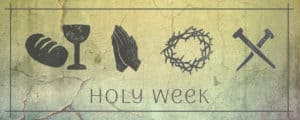
What is power? How would you define that simple and yet complex word? And after you define it, then tell me how does a person obtain it? Many would assume that power is the ability to control the actions of others. Power is seen in positions and titles. To have power there must be some sort of structure which has a hierarchy in place of who is over whom. We see this play out every day of our lives – the person taking your order at McDonald’s does not have as much power as the person who owns the place; the salesmen can’t tell his manager what to do; the general makes the command, the lieutenant obeys. This power can be used either positively or negatively. You’ve probably had good bosses and terrible bosses in your work career. Power used for the benefit of others will often result in the whole hierarchy succeeding.
But if that’s our working definition (and by the way, there are many more valid definitions), then who has the power on Good Friday?
Jesus stands before the Sanhedrin. He is bound and beaten; the council does the beating. Who has the power? The council does. They send Jesus to Pilate. Only he has the power to put someone to death. He commands his soldiers to flog Jesus. Who has the power? Pilate does. Pilate finds Jesus innocent of any crime, but he can’t let Jesus go because he is afraid of being called a traitor against Caesar by the crowd. Who has the power? The crowd does.
What does this teach us about power? It’s fickle. It’s temporary. It’s unwieldy. Everyone must answer to someone else. Nobody has all the power.
Except… look at this exchange between Jesus and Pilate: So Pilate asked him, “Are you not talking to me? Don’t you know that I have the authority to release you or to crucify you?” Jesus answered, “You would have no authority over me at all if it had not been given to you from above.” (John 19:10,11)
Who was really in control? Who had the power? God.
Jesus, true God, was in control. But his power was hidden. He didn’t make it known as most would have in his position. When arrested the night before, Jesus says that he could call down a legion of angels to protect, but he won’t. Jesus tells Pilate that he could leave at any moment, but he is a different type of king.
Jesus had the power, but he didn’t use it to control others. Jesus used his power to drink the cup of judgment that God the Father had given him. Jesus used his power not to control but to serve. He used his power to bring victory over sin, death, and the power of the devil by allowing himself to be hung on a tree, to be judged for our sins, and to be killed even though he was innocent. That is true power. The King of the world died by the world’s hand to save mankind from its sins.
On Good Friday we see Jesus in control. We see in his power Jesus cry out, “It is finished.” And after winning our salvation, he was still in control. John tells us, “Then, bowing his head, he gave up his spirit.” Death didn’t take his spirit. He didn’t succumb to his wounds. Jesus gave up his spirit. Death had no power over him. Of course, we see this greater still a few days later, when Jesus is raised from the dead, proving that he has power over it.
In his victory, Jesus doesn’t use his power to glorify himself. He uses it for you. St. Paul writes, “For we know that the one who raised the Lord Jesus will also raise us with Jesus and bring us (together with you) into his presence. In fact, all this is for your benefit, so that as grace increases, it will overflow to the glory of God, as more and more people give thanks.” (2 Corinthians 4:14,15 EHV)
May your Good Friday observance be one filled with blessing as you see the power of our Lord and Savior, Jesus Christ.
